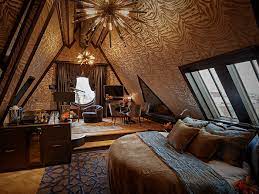Discover the Allure of Boutique Hotels: Where Luxury Meets Intimacy
When it comes to choosing accommodation for a getaway, travelers are increasingly seeking unique experiences that go beyond cookie-cutter hotels. Enter boutique hotels – a rising trend in the hospitality industry that offers a refreshing alternative for discerning travelers.
What exactly sets boutique hotels apart? Unlike large chain hotels, boutique establishments are characterized by their intimate size and personalized service. Each one is carefully designed with its own distinct personality and style, often reflecting the local culture or historical significance of its location.
One of the main draws of boutique hotels is their attention to detail. From the moment you step through the door, you’ll be greeted by an atmosphere that exudes charm and elegance. The carefully curated decor creates a sense of luxury and exclusivity, making guests feel like they’ve entered a private sanctuary.
But it’s not just about aesthetics; boutique hotels also prioritize exceptional service. With fewer rooms to manage, staff members can devote more time to each guest, ensuring their needs are met with care and precision. Whether it’s arranging personalized experiences or offering insider tips on local attractions, the staff at boutique hotels go above and beyond to create memorable stays.
Another advantage of staying in a boutique hotel is the opportunity to indulge in unique amenities. Many offer on-site spas, rooftop bars with panoramic views, or gourmet restaurants helmed by renowned chefs. These amenities add an extra layer of luxury and convenience, allowing guests to relax and unwind without ever leaving the premises.
Boutique hotels also tend to be strategically located in vibrant neighborhoods or scenic settings, allowing guests to immerse themselves in the local culture or enjoy breathtaking surroundings right at their doorstep. Whether it’s exploring bustling city streets or savoring tranquil natural landscapes, staying at a boutique hotel provides an ideal base for experiencing all that a destination has to offer.
Furthermore, these establishments often prioritize sustainability and eco-conscious practices. Many boutique hotels are committed to reducing their carbon footprint, utilizing renewable energy sources, and supporting local communities. By choosing to stay at a boutique hotel, travelers can contribute to responsible tourism and make a positive impact on the environment.
In an era where personalization and authentic experiences are highly valued, boutique hotels have emerged as the epitome of luxury and intimacy. They offer a retreat from the ordinary, allowing guests to create lasting memories in settings that are as unique as they are. So, whether you’re planning a romantic getaway or seeking a one-of-a-kind travel experience, consider the allure of boutique hotels – where luxury meets intimacy.
Frequently Asked Questions About Boutique Hotels in the UK
- What is a boutique hotel chain?
- What is the difference between boutique hotel and hotel?
- What are boutique and micro hotels?
- What is a boutique hotel meaning?
- What does boutique mean in hotel industry?
What is a boutique hotel chain?
A boutique hotel chain refers to a collection of boutique hotels that are owned or operated by the same company or organization. Unlike traditional hotel chains, which often feature standardized rooms and services, boutique hotel chains maintain a focus on individuality and uniqueness while offering consistent levels of quality and service across their properties.
These chains typically have a distinct brand identity that sets them apart from other hotels. They may emphasize specific themes, design aesthetics, or target niche markets to attract a particular type of traveler. Each property within the chain is carefully curated to reflect the brand’s ethos while incorporating local elements that highlight the destination’s culture or history.
While boutique hotel chains share common characteristics and values, they also strive to provide personalized experiences tailored to each guest. The aim is to combine the charm and intimacy of a boutique hotel with the convenience and reliability associated with larger hotel chains.
By establishing a chain of boutique hotels, companies can leverage their expertise in delivering exceptional guest experiences across multiple locations. This allows travelers to enjoy the unique ambiance and personalized service offered by boutique hotels while benefiting from the consistency and loyalty programs typically associated with larger hotel chains.
In summary, a boutique hotel chain brings together multiple properties under one brand umbrella, offering travelers a collection of distinctive accommodations that adhere to high standards of quality, service, and individuality.
What is the difference between boutique hotel and hotel?
The main difference between a boutique hotel and a regular hotel lies in their size, atmosphere, and overall experience they offer to guests.
Size: Boutique hotels are typically smaller in scale compared to traditional hotels. They often have fewer rooms, ranging from around 10 to 100, allowing for a more intimate and exclusive setting. Regular hotels, on the other hand, can range from medium-sized establishments to large-scale properties with hundreds or even thousands of rooms.
Atmosphere: Boutique hotels are known for their unique atmosphere and individuality. They often have carefully curated decor that reflects a specific theme or style, creating a distinct ambiance. These establishments focus on providing a more personalized experience, paying attention to details and offering attentive service. Regular hotels tend to have a more standardized approach, with uniform decor and amenities designed to cater to a broader range of guests.
Service: Boutique hotels pride themselves on delivering exceptional service. With fewer rooms to manage, staff members can dedicate more attention and time to each guest’s needs. This allows for a more personalized and attentive service experience compared to regular hotels that may handle larger volumes of guests simultaneously.
Amenities: While both boutique hotels and regular hotels offer amenities such as comfortable beds, private bathrooms, Wi-Fi access, and room service, boutique hotels often provide unique amenities that enhance the overall experience. These can include on-site spas, rooftop bars with panoramic views, specialty restaurants helmed by renowned chefs or local culinary experiences. Boutique hotels aim to create an immersive environment where guests can indulge in luxury and exclusivity.
Location: Boutique hotels are often strategically located in vibrant neighborhoods or scenic settings that reflect the local culture or natural beauty of the area. This allows guests to have easy access to attractions or immerse themselves in the local surroundings. Regular hotels may be found in various locations depending on their target market or proximity to popular tourist destinations.
Overall Experience: The main distinction lies in the overall experience offered by boutique hotels. They strive to create a unique and memorable stay, providing guests with a sense of exclusivity, attention to detail, and personalized service. Regular hotels, while still offering comfort and convenience, may have a more standardized approach with a focus on efficiency and catering to larger volumes of guests.
In summary, boutique hotels differentiate themselves from regular hotels through their smaller size, distinctive atmosphere, personalized service, unique amenities, strategic locations, and the overall experience they aim to provide. These factors contribute to the allure of boutique hotels for travelers seeking a more intimate and tailored accommodation option.
What are boutique and micro hotels?
Boutique hotels and micro hotels are both categories of accommodations that offer unique and intimate experiences for travelers. While they share some similarities, there are distinct differences between the two.
Boutique hotels are characterized by their small size, typically ranging from 10 to 100 rooms. They focus on providing personalized service and attention to detail. Boutique hotels often have a specific theme or design concept that sets them apart, reflecting the local culture or historical significance of their location. These establishments prioritize luxury, elegance, and a high level of comfort for their guests. Boutique hotels often feature unique amenities such as on-site spas, gourmet restaurants, or rooftop bars with stunning views. They are known for creating a sense of exclusivity and creating memorable experiences through their carefully curated ambiance.
On the other hand, micro hotels take the concept of small-scale accommodations to another level. Micro hotels are characterized by their extremely compact room sizes, typically ranging from 100 to 200 square feet (9 to 18 square meters). These establishments prioritize efficiency and functionality in their design and utilize innovative space-saving techniques to maximize every inch of the room. Micro hotels offer essential amenities in a minimalist fashion, focusing on providing comfortable beds, clean bathrooms, and efficient use of technology. While they may lack some of the luxurious features found in boutique hotels, micro hotels make up for it with affordability and accessibility.
Both boutique hotels and micro hotels aim to provide unique experiences for travelers seeking something beyond traditional chain hotels. They emphasize personalized service and attention to detail but differ in terms of size, amenities offered, and overall ambiance. Whether you prefer the luxurious intimacy of a boutique hotel or the minimalist efficiency of a micro hotel will depend on your personal preferences and travel needs.
What is a boutique hotel meaning?
A boutique hotel is a small, stylish, and often luxurious accommodation option that offers a unique and personalized experience for guests. Unlike larger chain hotels, boutique hotels are characterized by their intimate size, distinctive design, and attention to detail. These establishments typically have fewer rooms, allowing for a more personalized level of service and creating an atmosphere of exclusivity. Boutique hotels often reflect the local culture or historical significance of their location through their decor and ambiance. They prioritize creating a memorable and immersive stay by offering exceptional amenities, personalized services, and a sense of charm and elegance. Overall, boutique hotels aim to provide guests with a more intimate and authentic experience that goes beyond traditional hotel stays.
What does boutique mean in hotel industry?
In the hotel industry, the term “boutique” refers to a small, intimate, and stylish hotel that offers a unique and personalized experience to its guests. These hotels are typically independently owned and operated, as opposed to being part of a large chain.
The word “boutique” itself implies exclusivity and individuality. Boutique hotels are known for their attention to detail in terms of design, decor, and ambiance. Each boutique hotel is often designed with its own distinct theme or style that reflects the local culture or heritage of its location.
What sets boutique hotels apart from larger chain hotels is their emphasis on providing personalized service. With fewer rooms compared to larger establishments, staff members can dedicate more time and attention to each guest’s needs. This personalized approach often includes tailored experiences, customized amenities, and a warm and welcoming atmosphere.
Boutique hotels also tend to be located in unique settings such as historic buildings, trendy neighborhoods, or scenic landscapes. Their smaller size allows them to integrate seamlessly into their surroundings, offering guests an authentic experience that connects them with the local culture or environment.
Overall, boutique hotels offer a departure from the standardized experience found in larger chain hotels. They provide guests with an intimate and distinctive stay where luxury meets individuality, catering to those seeking a more personalized and memorable travel experience.




